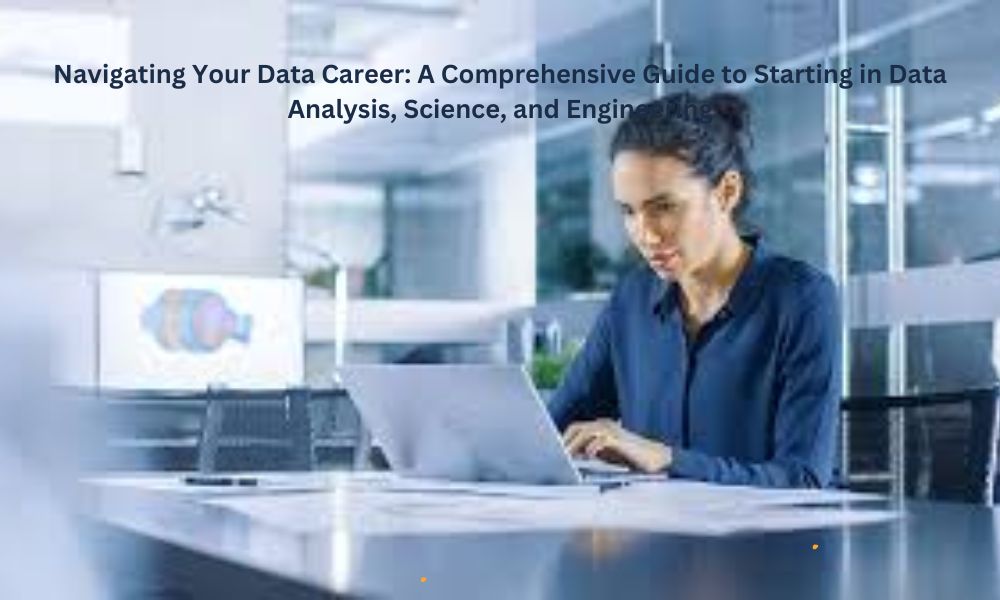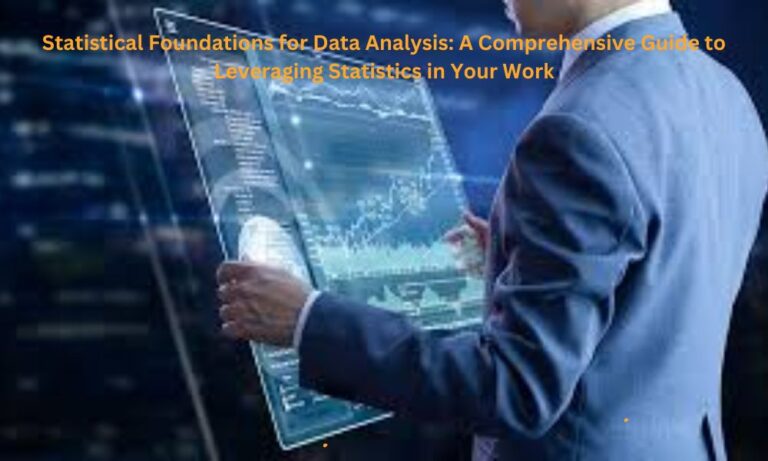Navigating Your Data Career: A Comprehensive Guide to Starting in Data Analysis, Science, and Engineering
Welcome to the dynamic realm of data, where opportunities abound for those eager to embark on a journey into data analysis, science, and engineering.
Embarking on a career in data is a thrilling endeavor, but understanding the intricate landscape is crucial. Data analysis, science, and engineering may seem interconnected, but each plays a distinct role.
In this comprehensive guide, we will explore the essential aspects of launching a successful career in the data field, from understanding the diverse roles to developing the necessary skills, and ultimately, thriving in this exciting industry.
Differentiating Data Analysis, Data Science, and Data Engineering
Data Analysis: This role involves interpreting and visualizing data to extract valuable insights. Proficiency in statistical analysis, data visualization tools, and tools like Excel and SQL is essential.
Data Science: Aspiring data scientists need a solid foundation in programming languages like Python or R, alongside machine learning fundamentals and data preprocessing skills.
Data Engineering: Data engineers focus on the architecture, construction, and maintenance of the systems and architectures that allow for the processing of vast amounts of data. Proficiency in database management and ETL processes is paramount.
Industry Overview: Demand and Opportunities in Each Domain
The demand for data professionals is skyrocketing across industries. Understanding the specific demands and opportunities in data analysis, science, and engineering is crucial for making informed career decisions.
Real-world applications demonstrate the impact of data in areas such as finance, healthcare, marketing, and technology. As technology advances, the need for skilled professionals in these fields continues to grow.
Essential Skills for Entry-level Roles
For those aiming to secure entry-level roles in data, a well-rounded skill set is key. Let’s break down the core skills required for data analysts, data scientists, and data engineers.
Core Skills for Data Analysts
- Statistical Analysis: Proficiency in statistical methods to derive meaningful insights from data.
- Data Visualization Techniques: Communicating findings through effective visualizations.
- Tool Proficiency: Mastery of tools like Excel, SQL, and others relevant to data analysis.
Key Competencies for Aspiring Data Scientists
- Programming Languages: Strong foundation in languages like Python and R.
- Machine Learning Fundamentals: Understanding and applying machine learning algorithms.
- Data Cleaning and Preprocessing: Ensuring data quality and preparing it for analysis.
Technical Skills for Data Engineers
- Database Management: Designing and managing databases for efficient data storage.
- ETL Processes: Expertise in Extract, Transform, and Load processes for seamless data integration.
- Big Data Technologies: Familiarity with technologies like Hadoop and Spark for handling large datasets.
Building a Solid Educational Foundation
A strong educational background is a cornerstone for a successful data career. Let’s explore the academic paths and continuous learning opportunities available for aspiring data professionals.
Academic Paths for Data Careers
- Pursuing degrees in Statistics, Computer Science, or related fields.
- Leveraging online courses and specializations from reputable platforms.
- Emphasizing the importance of continuous learning to stay abreast of industry advancements.
Gaining Practical Experience
Theory alone won’t cut it in the competitive world of data. Practical experience through internships, entry-level positions, and personal projects is invaluable.
Internships and Entry-level Positions
- The significance of gaining hands-on experience in real-world scenarios.
- Showcasing personal projects as evidence of practical skills.
Networking within the Data Community
- Joining online forums and communities to connect with peers and experts.
- Attending conferences and meetups for networking opportunities and staying updated on industry trends.
Crafting an Impressive Resume and Portfolio
In the data industry, a compelling resume and portfolio can set you apart. Tailor these documents to highlight your skills, projects, and achievements.
- Tailoring Your Resume: Customize your resume for data roles, emphasizing relevant skills.
- Highlighting Key Projects: Showcase projects that demonstrate your problem-solving abilities.
- Showcasing Relevant Skills: Communicate your proficiency in essential tools and technologies.
Acing the Interview Process
Securing a data role often involves acing the interview. Prepare for common questions and emphasize problem-solving skills.
Common Interview Questions in Data Roles
- How do you approach data cleaning and preprocessing?
- Can you give an example of a challenging data analysis problem you’ve faced and how you solved it?
- Explain a machine learning algorithm you’ve implemented and its impact.
Demonstrating Problem-Solving Skills
- Emphasizing the importance of critical thinking and problem-solving in data roles.
- Providing examples of how your skills have been applied to solve real-world challenges.
Importance of Communication and Collaboration
- Articulating findings effectively and communicating technical concepts to non-technical stakeholders.
- Highlighting the collaborative nature of data work and your ability to work within a team.
Navigating Industry Trends
The data industry is ever-evolving, and staying updated on emerging technologies is crucial for success.
Stay Updated with Emerging Technologies
- Keeping abreast of new tools, frameworks, and methodologies.
- Adapting to Changes in the Data Landscape: Being flexible and ready to pivot as the industry evolves.
Continuing Professional Development
- The importance of continuous learning through courses, workshops, and certifications.
- Investing time in self-improvement and skill enhancement to remain competitive.
Interactive Insights: Navigating the Data Career Landscape
Navigate the data career landscape more effectively by exploring interactive insights that provide actionable advice and resources.
Essential Tools and Courses
Discover a curated list of essential tools and online courses tailored for aspiring data professionals. Clickable links guide you to resources where you can enhance your skills in statistics, programming languages, and specialized tools, making your learning journey more efficient.
Industry Insights Dashboard: Unveiling Trends and Opportunities
Get a glimpse of the latest trends and opportunities in the data industry through an interactive dashboard. Visualize statistics on job demand, salary trends, and emerging technologies, empowering you to make informed decisions about your career path.
Networking Hub: Connect, Collaborate, Succeed
Explore an interactive networking hub featuring links to prominent data communities, forums, and events. Connect with peers, engage in discussions, and stay updated on industry happenings. Building a strong network is a key factor in the success of data professionals.
Diversity and Inclusion
Recognizing and championing diversity and inclusion in the data industry is crucial for its growth and innovation. Let’s explore initiatives and considerations that contribute to a more inclusive data community.
Empowering Voices: Stories of Diversity in Data
Highlighting the stories of individuals from diverse backgrounds who have made significant contributions to the data field. By embracing a variety of perspectives, the data industry becomes more dynamic, innovative, and representative of the global community.
Inclusive Hiring Practices: Creating Equal Opportunities
Explore the importance of inclusive hiring practices and organizations that actively promote diversity. Learn how companies are shaping their recruitment processes to ensure equal opportunities for candidates regardless of their background.
Building Bridges: Collaborative Initiatives for Diversity
Discover collaborative initiatives and programs focused on fostering diversity and inclusion in the data industry. From mentorship programs to scholarships, these efforts contribute to creating a more accessible and welcoming environment for aspiring data professionals.
Building a Personal Brand in the Data Community
Establishing a strong personal brand in the data community can open doors to exciting opportunities.
Creating an Online Presence
- Leveraging platforms like LinkedIn and GitHub to showcase your work.
- Sharing insights, projects, and contributions to the data community.
Sharing Insights and Contributions
- Writing blog posts, and articles, or participating in discussions to share your knowledge.
- Contributing to open-source projects to demonstrate your skills and commitment.
Engaging with Peers and Influencers
- Actively participating in online conversations and networking events.
- Collaborating with and learning from industry influencers and thought leaders.
Conclusion: Paving the Way to Your Data Career
As you embark on your data career journey, remember to leverage the insights provided in this comprehensive guide.
By honing your skills, gaining practical experience, and staying updated on industry trends, you’ll be well-equipped to navigate the dynamic landscape of data analysis, science, and engineering.
Frequently Asked Questions (FAQ)
How can I differentiate between data analysis, data science, and data engineering?
Data analysis involves interpreting and visualizing data, data science focuses on programming and machine learning, while data engineering is about designing and maintaining data systems.
What are the essential skills for an entry-level data analyst?
Core skills include statistical analysis, data visualization, and proficiency in tools like Excel and SQL.
How important is practical experience in securing a data role?
Practical experience through internships, entry-level positions, and personal projects is crucial to showcasing the real-world application of skills.
How can I stay updated on emerging technologies in the data industry?
Stay engaged with online communities, attend conferences, and invest in continuous learning through courses and certifications.
Why is a personal brand important in the data community?
A strong personal brand on platforms like LinkedIn and GitHub enhances visibility, opens networking opportunities, and showcases your expertise to potential employers.


